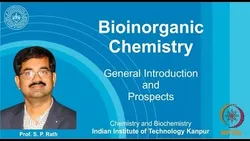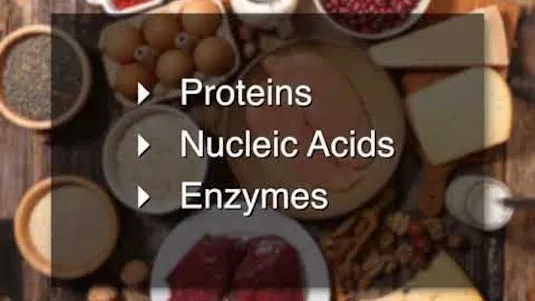
Essentials of Biomolecules : Nucleic Acids and Peptides 
This course provides an essential overview of the chemistry and biology of two important classes of biomolecules: nucleic acids (DNA/RNA) and proteins. Students will learn how structural features are translated into biological functions, how chemical reactions are used to replicate DNA and synthesize proteins, and how organic chemistry tools and enzymes are used to determine sequences and modify biomolecules. The course also covers modern techniques, such as high-throughput detection, single nucleotide polymorphisms, and disease diagnosis. It is suitable for chemistry, biochemistry, and biotechnology students with basic knowledge in organic chemistry. ▼
ADVERTISEMENT
Course Feature
![]() Cost:
Cost:
Free
![]() Provider:
Provider:
Swayam
![]() Certificate:
Certificate:
Paid Certification
![]() Language:
Language:
English
![]() Start Date:
Start Date:
22nd Jan, 2023
Course Overview
❗The content presented here is sourced directly from Swayam platform. For comprehensive course details, including enrollment information, simply click on the 'Go to class' link on our website.
Updated in [May 25th, 2023]
This course, Essentials of Biomolecules: Nucleic Acids and Peptides, provides an overview of the chemistry and biology of two important classes of biomolecules: nucleic acids (DNA/RNA) and proteins. Students will learn how structural features are translated into biological functions, how highly organized and selective chemical reactions are adopted to replicate DNA or synthesize proteins, and how organic chemistry tools and enzymes are used to determine sequences of DNA and proteins. The course also covers modern techniques such as the development of biomolecular probes, high-throughput detection of biomolecules, single nucleotide polymorphisms, and disease diagnosis. This course is intended for chemistry, biochemistry, and biotechnology students who have a basic knowledge of organic chemistry. It is also relevant to those working in the pharmaceutical and biotechnology industries.
[Applications]
Upon completion of this course, students will be able to apply their knowledge of nucleic acids and peptides to a variety of fields. They will be able to use organic chemistry tools to determine sequences of DNA and proteins, as well as to modify biomolecules to mimic similar biological properties. Additionally, they will be able to develop biomolecular probes for high-throughput detection of biomolecules, single nucleotide polymorphisms, and disease diagnosis. This course will be beneficial to students interested in pursuing careers in the pharmaceutical and biotechnology industries.
[Career Paths]
1. Biomolecular Scientist: Biomolecular Scientists are responsible for researching and developing new biomolecules and their applications in the medical, pharmaceutical, and biotechnology industries. They use their knowledge of organic chemistry and chemical biology to design and synthesize new molecules, analyze their properties, and develop new methods for their use. This field is rapidly growing, with new advances in technology and research leading to new discoveries and applications.
2. Biomolecular Engineer: Biomolecular Engineers are responsible for designing and developing new biomolecules and their applications in the medical, pharmaceutical, and biotechnology industries. They use their knowledge of organic chemistry and chemical biology to design and synthesize new molecules, analyze their properties, and develop new methods for their use. This field is rapidly growing, with new advances in technology and research leading to new discoveries and applications.
3. Biomolecular Technician: Biomolecular Technicians are responsible for performing laboratory tests and experiments to analyze the properties of biomolecules. They use their knowledge of organic chemistry and chemical biology to analyze the properties of biomolecules, develop new methods for their use, and troubleshoot any issues that arise. This field is rapidly growing, with new advances in technology and research leading to new discoveries and applications.
4. Biomolecular Researcher: Biomolecular Researchers are responsible for researching and developing new biomolecules and their applications in the medical, pharmaceutical, and biotechnology industries. They use their knowledge of organic chemistry and chemical biology to design and synthesize new molecules, analyze their properties, and develop new methods for their use. This field is rapidly growing, with new advances in technology and research leading to new discoveries and applications.
[Education Paths]
1. Bachelor of Science in Biochemistry: This degree program provides students with a comprehensive understanding of the chemical and biological processes that occur in living organisms. Students learn about the structure and function of proteins, carbohydrates, lipids, and nucleic acids, as well as the biochemical pathways that regulate metabolism. This degree program also covers topics such as genetics, molecular biology, and biotechnology. Developing trends in this field include the use of bioinformatics to analyze large datasets, the development of new drugs and therapies, and the use of synthetic biology to engineer new organisms.
2. Master of Science in Chemical Biology: This degree program focuses on the application of chemical principles to the study of biological systems. Students learn about the structure and function of biomolecules, as well as the chemical processes that regulate their interactions. This degree program also covers topics such as drug design, enzyme engineering, and the development of new diagnostic tools. Developing trends in this field include the use of nanotechnology to study biological systems, the development of new drugs and therapies, and the use of artificial intelligence to analyze large datasets.
3. Doctor of Philosophy in Biomolecular Engineering: This degree program focuses on the design and development of new biomolecules and biological systems. Students learn about the structure and function of proteins, carbohydrates, lipids, and nucleic acids, as well as the biochemical pathways that regulate metabolism. This degree program also covers topics such as synthetic biology, gene editing, and the development of new diagnostic tools. Developing trends in this field include the use of nanotechnology to study biological systems, the development of new drugs and therapies, and the use of artificial intelligence to analyze large datasets.
4. Master of Science in Molecular Medicine: This degree program focuses on the application of molecular biology to the study of human diseases. Students learn about the structure and function of proteins, carbohydrates, lipids, and nucleic acids, as well as the biochemical pathways that regulate metabolism. This degree program also covers topics such as gene therapy, drug design, and the development of new diagnostic tools. Developing trends in this field include the use of nanotechnology to study biological systems, the development of new drugs and therapies, and the use of artificial intelligence to analyze large datasets.
Course Provider

Provider Swayam's Stats at AZClass
Discussion and Reviews
0.0 (Based on 0 reviews)
Explore Similar Online Courses

Twined Knitting

Epidemics Pandemics and Outbreaks

Python for Informatics: Exploring Information

Social Network Analysis

Introduction to Systematic Review and Meta-Analysis

The Analytics Edge

DCO042 - Python For Informatics

Causal Diagrams: Draw Your Assumptions Before Your Conclusions

Whole genome sequencing of bacterial genomes - tools and applications

Principles of Biochemistry

Bioinorganic Chemistry


Start your review of Essentials of Biomolecules : Nucleic Acids and Peptides